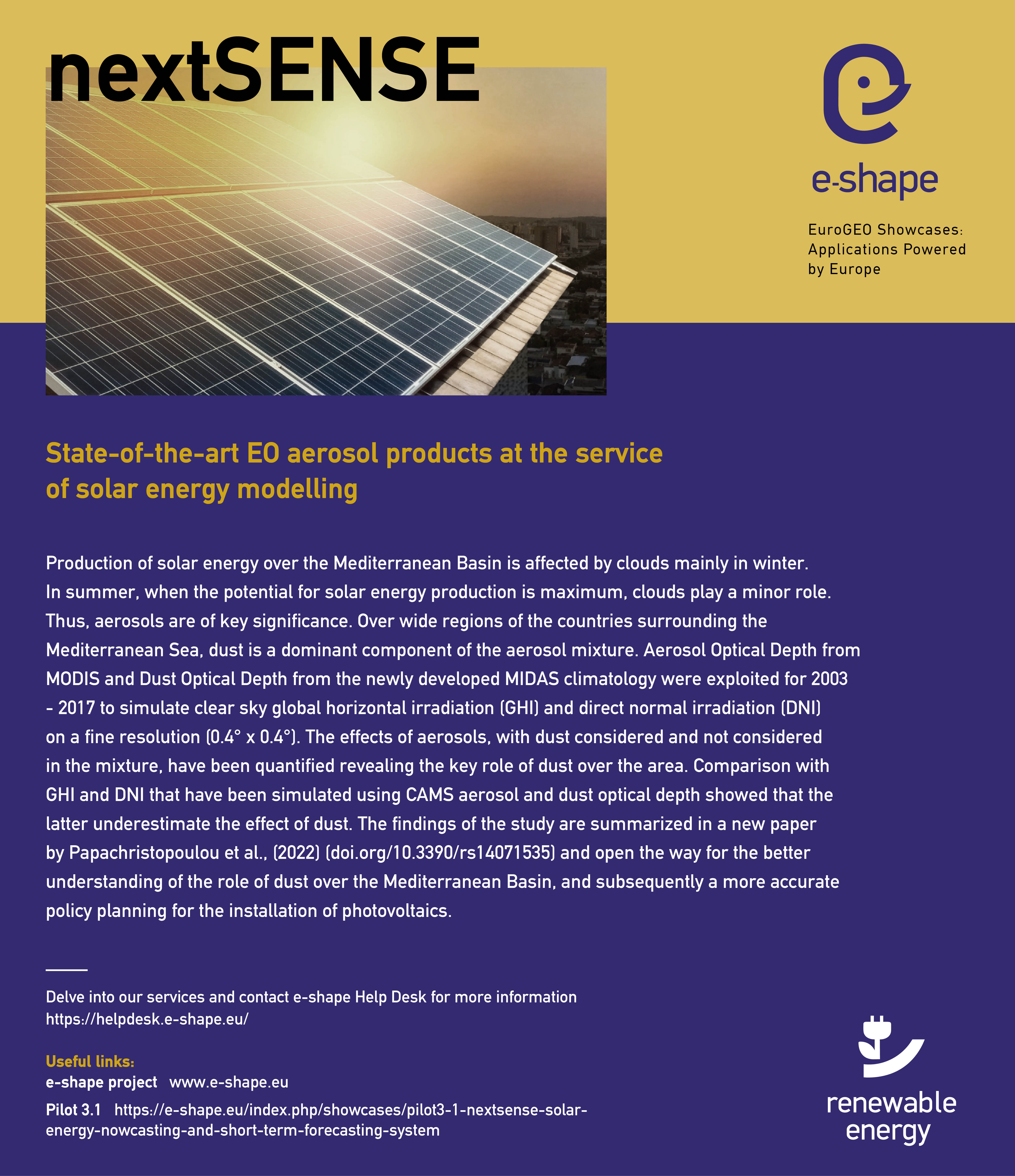Pilot6 | EO-based surveillance of POPs pollution
Pilot 3.1 | nextSENSE: solar energy nowcasting & short-term forecasting system

The consequences of rapidly rising global temperatures will be far-reaching and devastating for humans and the environment unless urgent action is taken globally to curb emissions. To this direction, the United Nations and the European Commission (EC) have set as its main sustainable development goals by 2030 to contribute to climate actions and ensure good health and well-being by providing universal access to affordable, reliable and modern energy services. EC Renewable Energy Directive establishes an overall policy for the production and promotion of energy from renewable sources in the European Union. As a result, renewables currently account for more than 22% of total global electricity generation, of which more than 400 GW produced from solar systems in 2017. This brings to the fore the simultaneous vital need for improved Earth Observation (EO) solutions for the continuous monitor of solar energy potential and fulfil the increasing integration of solar farms into the electricity grids, the load exchanges, as well as the efficient electricity transmission and distribution. Therefore, through joint solar energy implementation funded projects, the EC's renewable energy policy aims to set up a low carbon environment with relevant services and support by existing and new EO techniques dealing with accurate, nowcast, short-term (STF) and long-term forecast estimations of solar energy. Description of the service is provided at the following link: https://e-shape.eu/index.php/eshape-services.
/ Objectives
- To use, improve and incubate EU-funded (Geo-Cradle) and other (CAMS) available innovation instruments, relative with nextSENSE products.
- Τo upscale existing techniques in larger domains and serve a large variety of users (decision makers, citizens, national bodies). Use Geo-Cradle's networking platform, regional datahub, end user needs and solar energy related information in order to develop a tool able to be tailored to the needs of any domain and solar energy (nowcasting and STF) related product needed.
- To demonstrate and deploy further the nowcasting and STF solar energy products (e.g. Egypt, Cyprus, Greece).
- To use existing CAMS related products (HelioClim-3v5, McClear) for STF at specific regions.
- To engage relative stakeholders (as defined from the geo-Cradle project): end-users but also uptake commercialization and internationalization related service industry.
- To showcase through GEOSS related and developed tools and the renewable energy related benefits, towards a sustainable Energy development (SDG7 target for 2030 energy mix).
- To contribute towards GEO vision for co-ordinated EO information to citizens, businesses and science
/ Partners
NOA, PMOD-WRC, CEDARE, ARMINES, TSV
/ Key Users
Power transmission operators and Distributors, (The Public Power Corporation Renewables S.A. (PPCR), the National Independent Power Transmission Operator S.A. (IPTO) of Greece), Environmental and Energy Ministries (The Ministry of Electricity and Renewable Energy of Egypt), Large and small scale solar PV parks and concentrated solar plants, Policy Makers, Industry
/ Key Datasets
- EUMETSAT's CM SAF and MSG (Cloud properties).
- CAMS Aerosol optical depth (AOD) forecast data and water vapor data. Long term Global horizontal irradiance, Direct normal irradiance and AOD data sets.
- in-situ ground-based aerosol optical properties data and information.
- AEROCOM aerosol properties (aerosol absorption, scattering)
- EO based satellite data for trace gases: total column ozone (OMI/TropOMI satellite) and NO2(monthly climatology).
- Sentinel data for additional parameters (e.g. surface albedo, cloud properties/climatologies)
- McClear and HelioClim-3v5 data/algorithms
- Pre-calculated radiative transfer model outputs (Libradtran)
- NCW SAF Eumetsat software (clouds)
/ ID Card
A service that will provide a Pan-European scale scientific information about solar radiation/energy forecast and business oriented information on management and planning on Distribution System Operators, private companies and individual solar energy related users.
Stay in the loop !
Acknowledgment
The e-shape project has received funding from the European Union’s Horizon 2020 research and innovation programme under grant agreement 820852









